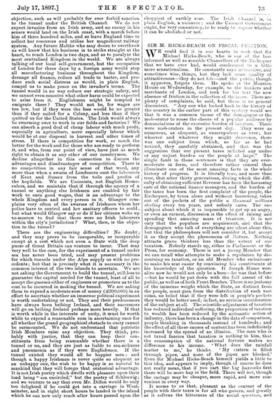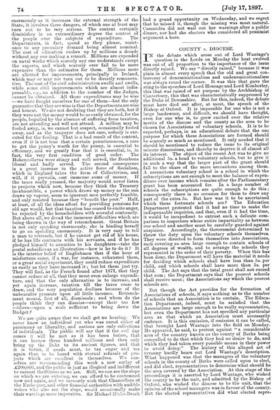SIR M. HICKS-BEACH ON FISCAL FRICTION.
WE could find it in our hearts to wish that Sir Michael Hicks-Beach, who is one of the best informed as well as sensible Chancellors of the Exchequer that we have ever had, would condescend to a little more sensationalism. He constantly says imtruetive, and sometimes wise, things, but they lack seine quality of attractiveness—they do not bite—and the public, though it approves, forgets them. He spoke at the Mansion House on Wednesday, for example, to the bankers and merchants of London, and took for his text the new absence of friction in the collection of the tares. There are plenty of complaints, he said, but there is no general discontent. "Any one who looked back to the history of the country in the earlier part of this century would see that it was a common theme of the demagogue or the mob-orator to rouse the cheers of a popular audience by denunciations of the excessive burden of taxation. There were mob-orators iu the present day. They were as numerous, as eloquent, as unscrupulous as ever ; but whoever and whatever they might denounce, there was one subject from which, so far as he had noticed, they carefully abstained, and that was the suggestion that our present taxes inflicted any undue or any unjust burden on the people at large." The single fault in those sentences is that they are over- moderate in form, and therefore rather conceal than illuminate one of the most amazing facts in the whole history of progress. It is literally true, and more than true, that after thirty generations, during which the diffi- culty of obtaining sufficient Revenue has been the harassing care of the national finance managers, and the burden of the taxes has been the first complaint of the people, the Exchequer, by taxes alone and without borrowing, takes out of the pockets of the public a thousand millions sterling every ten years, and nobody cares. The one subject about which it is impossible to get up an angry, or even an earnest, discussion is the effect of raising and spending that amazing mass of treasure. It is not only that the populace are acquiescent, and that the demagogues who talk of everything are silent about this, but that the philosophers will not consider it, but accept it as they accept the phenomena of Nature. Nothing attracts grave thinkers less than the extent of our taxation. Nobody stands up, either in Parliament or the Press, for economy. There is not a young Member that we can recall who attempts to make a reputation by dis- coursing on taxation, or an old Member who endeavours to make his seat easier by convincing his constituents of his knowledge of the question. It Joseph Hume were alive now he would not only be a bore—he was that before —but he would be put down with the full assent of the public, as well as of both Front Benches. There is no jealousy of the immense weight which the State, as distinct from the people, must gain from the distribution of such vast sums, no belief that if they were left in people's pockets they would be better used; in fact, no serious consideration of the subject at all. The scientific adjustment of taxation has reduced individual suffering, the proportion of taxation to wealth has been reduced by the automatic action of industry, there has been a change in the data of comparison, people thinking in thousands instead of hundreds ; and the effect of all these causes of content has been indefinitely increased by the spread of an illusion. The man who is not taxed fancies that taxation is nothing to him, that the consumption of the national fortune makes no difference to his income. ' What does the rainfall matter to me,' he thinks. My cistern is filled through pipes, and none of the pipes are blocked.' Even Sir Michael Hicks-Beach himself yields a little to this idea, and appears to imply, though of course he does not really mean, that if you cart the big haycocks first there will be more hay in the field. There will not, though the cartage may be cheaper, more rapid, and more con- venient in every way.
It seems to us that, pleasant as the content of the people with their taxes is for all who govern, and greatly as it softens the bitterness of the social question, and enormously as it increases the external strength of the State, it involves three dangers, of which one at least may turn out to be very serious. The content certainly diminishes in an extraordinary degree the control of the people over the subjects of expenditure. The Departments, in fact, spend as they please, resist- ance to any pecuniary demand being almost nominal. The cost of education rushes up by millions a decade without any one making a remark. Millions are expended on naval works which scarcely any one understands except the experts, and which scarcely ever fail to be more expensive than the estimates for them. Millions more are allotted for improvements, principally in Ireland, which may or may not turn out to be directly remunera- tive. The cost of the civil administration swells and swells, while some civil improvements which are almost indis- pensable, e.g., an addition to the number of the Judges, cannot be obtained. All these expenditures may be wise —we have fought ourselves for one of them—but the only guarantee that they are wise is that the Departments are wise and honest. We are not doubting that they are both, but if they were not the money would be as easily obtained, for the people, beguiled by the absence of suffering from taxation, are not attending and will not attend. A million may be fooled away, is, we cannot but suspect, occasionally fooled away, and as the taxpayer does not care, nobody is exe- cuted for the fooling. That is a bad result of the content, even if it is not true that a certain penuriousness, a care to get the penny's worth for the penny, is essential to efficiency, and we greatly fear that it is essential, is, in fact, the very first condition of good order. The Hohenzollerns were stingy and well served, the Bourbons liberal and badly served. The second consequence is a great increase in the active force of Socialism, which in England takes the form of Collectivism, and will, if it prevails, cost immense sums of money. If the taxes really pressed, the majority would never listen to projects which now, because they think the Treasury inexhaustible, a power which draws up money as the sun draws up vapour, seem to ignorant men perfectly feasible, and only resisted because they "benefit the poor." Half, at least, of all the ideas afloat for providing pensions for old age would, but that taxation has ceased to excite anger, be rejected by the householders with scornful contumely. But above all, we dread the immense difficulties which are being thrown in the way of retrenchment. Great Britain is not only spending enormously, she is binding herself to go on spending enormously. It is very easy to tell a man to retrench, but if he cannot get rid of his house, if he has life contracts with his servants, and if he has pledged himself to annuities to his daughters—take the postal subsidies as an illustration—how is he to do it ? It is the interior belief of Englishmen that if the hour of misfortune came, if a war, for instance, exhausted them, or a great social experiment, they could reduce expenditure as easily as they have increased it ; but let them just try. They will find, as the French found after 1871, that they cannot reduce at all, that they must even enlarge expendi- ture, and that the only alternative is to increase, and yet again increase, taxation till the taxes cease to draw, and the very population declines because of the unbearable pressure upon all little incomes. Retrench- ment means, first of all, dismissals ; and whom do the people think they can dismiss—except their too few soldiers—upon a scale sufficient to bring down the Budget We are quite aware that we shall get no hearing. We never knew an individual yet who was cured either of parsimony or liberality, and nations are only collections of individuals. The public will say that if the evil day comes it will be met as it has been before, that it can borrow three hundred millions and then only bring up the Debt to its ancient figures, and that it is better, if needs must, to tax sugar and tea again than to be bored with eternal refusals of pro- jects which are excellent in themselves. We our- selves are recommending this week a new outlay of £200,000, and the public is just as illogical and indifferent to earnest thriftiness as we are. Still, we can see the slope on which we are entering, we can afford to be contemned now and again, and we earnestly wish that Chancellors of the Exchequer, and other financial authorities with audible voices who also see the slope, would occasionally make their warnings more imperative. Sir Michael Hicks-Beach had a grand opportunity on Wednesday, and we regret that he missed it, though the missing was most natural. Cassandra did not wail out her warnings after a public dinner, nor had she electors who considered all pessimist argument a bore.



































 Previous page
Previous page